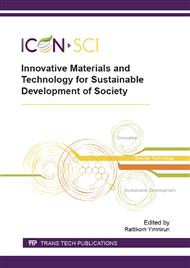p.321
p.325
p.329
p.333
p.337
p.341
p.347
p.351
p.355
The Construction and Evaluation of Instructional Package on Vector Quantity
Abstract:
In this study, an instructional package to enhance teaching and learning on Vector Quantity was constructed. It consisted of three types of media; teaching documents, a PowerPoint presentation and an experimental set for measurement of vector components. The validity and reliability of this package was assessed prior to utilization in the evaluation of impact on students’ learning achievement. The sample consisted of 60 Bachelor of Science students. They were selected by multi-stage sampling and divided into an experimental group and a control group. The instructional package was utilized in teaching the experimental group while the control group was taught conventionally. The results of this study revealed that: 1) the magnitude of vector components measured by using the experimental set was equal to that determined by conventional calculation, significantly at the .05 level, 2) the quality of the instructional package was rated as excellent, and 3) the learning achievement of the experimental group was higher than the control group with statistical significance level of 0.05. Thus, the instructional package could encourage students’ motivation and promote successful learning.
Info:
Periodical:
Pages:
351-354
DOI:
Citation:
Online since:
October 2015
Authors:
Keywords:
Price:
Сopyright:
© 2015 Trans Tech Publications Ltd. All Rights Reserved
Share:
Citation:


